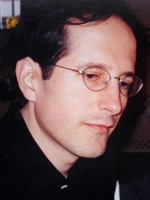Alexander Alberro graduated from UBC with a Bachelor of Arts (Art History major) in 1986, and a Master of Arts in Art History in 1990.
  |
|
Why did you choose to attend UBC in particular?
UBC is an excellent university. As an undergraduate, I found the active research agenda of many of my professors contagious. My decision to continue my studies at the graduate level was largely due to the outstanding faculty in art history at UBC in the mid-1980s, which included Professors Marvin Cohodas, Serge Guilbaut, Carol Knicely, John O’Brian, Maureen Ryan, Jeff Wall, and others.
What positions have you held since graduating?
I entered the PhD program at Northwestern University in 1990. Immediately upon completing my PhD studies in 1996, I was recruited by the University of Florida as Assistant Professor of Modern Art History. In 2003, I was promoted to the rank of Associate Professor of Modern Art History with tenure. In 2006, I taught as Visiting Associate Professor of Art History at the University of California at Berkeley. In 2008, I was recruited by Barnard College and Columbia University as Associate Professor of Art History with tenure, and in 2010 I was promoted to the rank of Professor. The Barnard/Columbia position includes an endowed chair: I am presently the Virginia Bloedel Wright Professor of Modern and Contemporary Art History at Barnard College and Columbia University.
How did your experience at UBC prepare you for these positions?
The undergraduate courses I took in the mid-1980s with Professors David Solkin and Carol Knicely were fundamental to my decision to major in art history; Serge Guilbaut and Jeff Wall’s graduate seminars of the late 1980s were pivotal in my decision to pursue a PhD degree in art history in late modern and contemporary art.
What are you currently working on?
I’m currently completing one book, “Abstraction in Reverse,” which studies the emergence and development of abstract art in Latin America. I am also at work on a volume that explores new forms of art and spectatorship that have crystallized in the past two decades.
What advice do you have for incoming or graduating students to the Department of AHVA?
Doubt everything.


